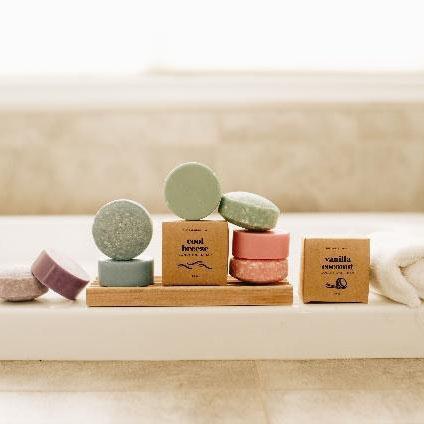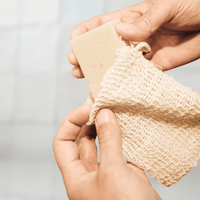
Whether you want to reduce your plastic waste, save money or just take your hair game to the next level, switching to plastic-free shampoo is one of the best beauty swaps you can make. Not only are shampoo bars super-concentrated with botanical ingredients to support healthier hair, but they also come with minimal packaging.
However, if you live in a region with hard water, you may have noticed some unwanted side effects from your low-waste hair care routine. We’re referring to waxy buildup in the hair, dull locks and straw-like strands.
So, what gives? Why do shampoo bars and hard water not seem to mix? And, more importantly, what can you do about it? Keep reading to learn more about hard water and how to make the transition to eco-friendly shampoo bars a little easier.
What Is Hard Water?
First things first — what is hard water, anyway? Basically, it’s water that accumulates high levels of calcium, magnesium and other naturally occurring minerals as it passes through the water cycle. As the water picks up more minerals, it gets harder and harder. These minerals can build up in your hair, making it dry, brittle and easily tangled.
Along with frustrating hair problems, other common signs of hard water include:
- Dry, itchy skin
- Poor lather with your shampoo
- Crusty faucets
- Spotty dishes
Experts estimate that roughly 85 percent of the United States has varying degrees of hard water, with the Midwest having some of the highest levels. If you want to test your hard water, check with your city’s website or consider testing your water at home.
Why Some Shampoo Bars and Hard Water Don’t Get Along
Many shampoo bars contain oils that have been saponified, which is simply the process of turning oils into soap. Soap molecules like to bind to the minerals in hard water, potentially leaving a waxy residue behind called soap scum.
To be completely fair, this problem isn’t unique to shampoo bars. Hard water can also interfere with the cleansing agents in liquid shampoos, making it difficult to get a good lather going.
Tips for Using a Shampoo Bar with Hard Water
Don’t worry – the solution isn’t to ditch shampoo altogether! One of the best ways to solve the problem of hard water is to install a water softener to filter out high concentrations of minerals.
If that’s not doable, try one of these tips for using a shampoo bar with hard water.
1. Choose the Right Bar
Not all shampoo bars are created equal! If you want to give your strands a fighting chance against hard water, choose a hydrating shampoo bar that’s packed with nourishing ingredients — like coconut oil and glycerin (a natural humectant). Our bars are super-concentrated and boast nutritious vitamins that will leave your hair feeling soft and silky.
2. Try an Apple Cider Vinegar Rinse
Even with the right shampoo bar, the minerals in hard water can still build up in your hair and block other hydrating ingredients from your scalp. One way to get rid of all that gunk without resorting to oil-stripping sulfates is by rinsing your hair with apple cider vinegar every so often.
Why apple cider vinegar? According to the experts, the acidity of apple cider vinegar may help restore your hair’s pH balance by counteracting the alkalinity of hard water.
3. Don’t Skip the Conditioner
Hard water can leave hair feeling dull and brittle. To combat the drying effects of hard water, reach for a conditioner bar designed to fortify and repair hair with plant-based ingredients. Our plastic-free conditioner bars feature potent plant-based ingredients that hydrate hair without weighing it down.
4. Invest in a Good Comb
Tangled hair can be a huge problem with hard water. When minerals stick to your hair, it often leads to stubborn knots and breakage. To effortlessly detangle knotty hair, try brushing with a bamboo comb. This high-quality comb has smooth, wide bristles that glide through hair without pulling. For best results, detangle in the shower with your conditioner bar.
5. Wash Hair with Lukewarm Water
Washing your hair with piping hot water will strip the natural oils from your scalp, while washing your hair with cold water may not be as effective at getting rid of the hard water residue in your hair. Instead, wash your tresses with lukewarm water to remove buildup without causing overdrying.
Reduce Hard Water Hair Damage with The Earthling Co.
If you live in the Midwest, Texas, Florida or another state that’s known for having hard water, finding the right shampoo bar is essential to keeping your hair soft and healthy. While our bars can’t magically make your water softer (only a water softener can do that), their high concentration of rich, botanical ingredients can help reduce the effects of hard water hair damage.
So, what are you waiting for? Try a shampoo bar today and let us know what you think!







